Blog
Dental hygiene tips for healthy teeth & gums

Natural Sweeteners for Your Dental Health
It is well known that having too many sweets can make dental problems like cavities and tooth decay worse. But your mouth health shouldn’t get worse because you gave in to your sweet tooth. Both natural and artificial sweeteners have the same function: to add sweetness without adding calories to the diet.
However, natural sweeteners do not affect your health adversely. Use a natural sweetener instead of processed sugar if you want to cut down on sugar without hurting your teeth. Here are some natural sugar alternatives suggested by Westgreen Dental & Orthodontics that are good for your teeth.
Natural Sugar Alternatives for Healthy Teeth
-
Stevia
The plant Stevia, which is used to make sweets, is a natural sugar. Steviol glycosides make things sweet, and they don’t change blood sugar levels. Stevia won’t damage your teeth like sugar does. Stevia is a sweetener that is better for your teeth than sugar. In fact, there is some proof that it may even stop the bacteria that cause cavities from growing.
-
Xylitol
As a sweetener, this molecule is present in many sugar-free gum products as well as mouthwash and toothpaste. Xylitol promotes saliva production, which aids in remineralizing enamel and inhibits the growth of dangerous oral bacteria, hence reducing the likelihood of cavities, according to studies.
-
Erythritol
One such sugar alcohol that can be found in naturally soured foods and fruits is erythritol. Many sugar-free and reduced-sugar goods use it as a sugar substitute due to its low-calorie content. Not only does it not lead to tooth decay, but it also does not increase blood sugar levels.
-
Monk Fruit Extract
The fruit of the Siraitia Grosvenorii plant is used to make Luo han guo, which means “monk fruit extract.” A lot of people want it because it’s sweet and low in calories. Mogrosides are an antioxidant that can be found in monk fruit juice. Some studies suggest that the anti-inflammatory properties of monk fruit extract are also good for your dental health.
-
Coconut Sugar
Coconut sugar comes from the sap of coconut palm trees and is a popular natural alternative to refined sweets. With elements like magnesium, potassium, and zinc that are found in coconut sap, it keeps some of those nutrients. It still has calories and can change blood sugar levels, but coconut sugar has a lower glycemic index than table sugar.
-
Maple Syrup
When you boil the sap from maple trees, you get a syrup. Maple syrup tastes very sweet. The manganese and zinc are both present in it. It is recommended that you cut down on the amount of maple syrup you eat in order to avoid cavities and keep your teeth healthy. Even though it has more healthy ingredients and has been treated less than white sugar, it is still sugar.
Conclusion
Finally, if you want something sweet but want to keep your teeth healthy, choose natural sweeteners over artificial sugars. Stevia, xylitol, erythritol, coconut sugar, maple syrup, and monk fruit extract are some sweeteners that are better for your teeth. They can be used instead of sugar and won’t hurt your teeth or make your blood sugar go crazy.
If you have questions about your oral health, you should talk to a dentist or other trained medical professional. Westgreen Dental & Orthodontics says that the best way to protect your teeth and gums is to do things in moderation. Also, regular brushing, flossing, and avoiding specific foods and drinks are ideal for teeth and gums.
